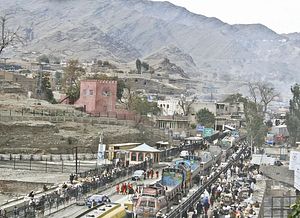The Pakistani authorities have recently implemented visa requirements at the Torkham border crossing between Pakistan and Afghanistan.
The new border controls have left hundreds of people stuck at the border area. Afghans wanting to cross into Pakistan without valid visas are denied entry after the rules came into effect from June 1.
Located on the Durand Line border, Torkham is a key border crossing between Pakistan and Afghanistan. For a number of years, the area has served as a busy port of entry for businesses, refugees, and citizens who move back and forth, with up to 15,000 Afghans making the crossing each day.
The crossing is packed with cargo-filled vehicles and buses carrying many passengers. Many travelers shuttle back and forth to make ends meet. Others have families on both sides of the 2,000 kilometer-long border. The new rules mean Afghans living along the border will need a valid passport and visa to see their families on the other side.
“I have to cross the border every morning to go to work and return home. How can I get visa every time?” Mohammed Yusuf, an Afghan national, told Al Jazeera.
“How can each visiting family member pay $300 for a passport?”
Many people who use Torkham regularly were unaware of the new visa requirement when the changes were introduced last week.
The restrictions are also likely to affect an estimated one million Afghan refugees living in Pakistan. Afghan refugees in Pakistan have used the crossing without a passport or visa to commute for nearly 40 years. The new rules now curb their entry by requiring them to produce a valid visa if they want to enter Pakistan via Torkham.
The Torkham border has long been a source of tension between the two South Asian states.
Islamabad claims that it wants to stop militants from crossing into Pakistan who have previously mounted a string of attacks.
The Pakistani government believes that those behind the attacks on Bacha Khan University (BKU) near Charsadda, Pakistan Air Force base in Badabher and the Army Public School crossed over from Torkham to enter the country. The government has also criticized Kabul for not stepping up to demobilize members of the Pakistani Taliban who waged attacks on Pakistan.
Kabul is unhappy with the newly imposed border controls at Torkham, calling the restrictions “unilateral” in nature.
Many speculate that the tightening security at Torkham border is a political move rather than curbing on militancy activities. Experts say that the decision was taken amid rising tensions between the two countries since efforts to resume peace talks with the Taliban were unsuccessful. Others believe that Islamabad introduced the border control after Afghanistan, India, and Iran revealed that they will be signing a pact to develop Chabahar Port in Iran.
Pakistan announced that the Torkham model will be replicated on seven other key points in the Federally Administered Tribal Areas and Balochistan.
As for Torkham, walk-through gates and scanning machines have been installed to check travelers and their luggage. At the moment, only Pakistani officials are manually checking passports and visas. The officials at the Afghan side are letting people to cross the border visa-free.
While the two governments are embroiled over the border security issue, thousands of people on both sides will now have to buy visas which they may not be able to afford. Drivers on both sides of the border are worried that the new move will adversely affect their business.
Roshni Kapur is an independent journalist based in Singapore.

































